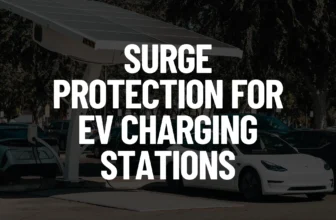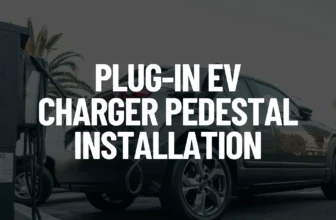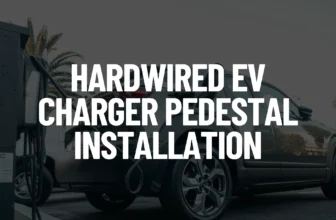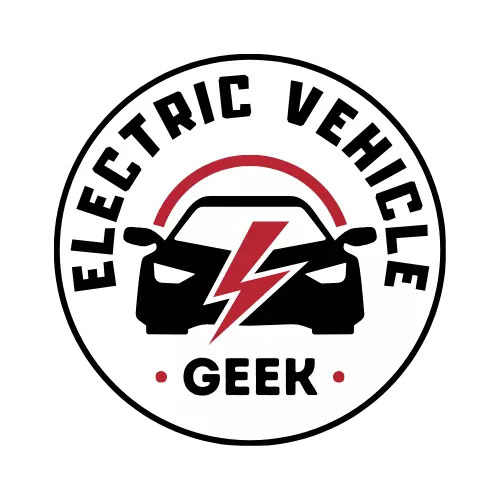Arc fault EV charger circuit breakers (AFCBs) are used in electric vehicle branch circuits to safeguard your EV charger installation from potential fire hazards caused by arc faults in the EV branch circuit caused by arc faults, overloads, short circuits, ground faults, faulty AFCB, and electrical noises.
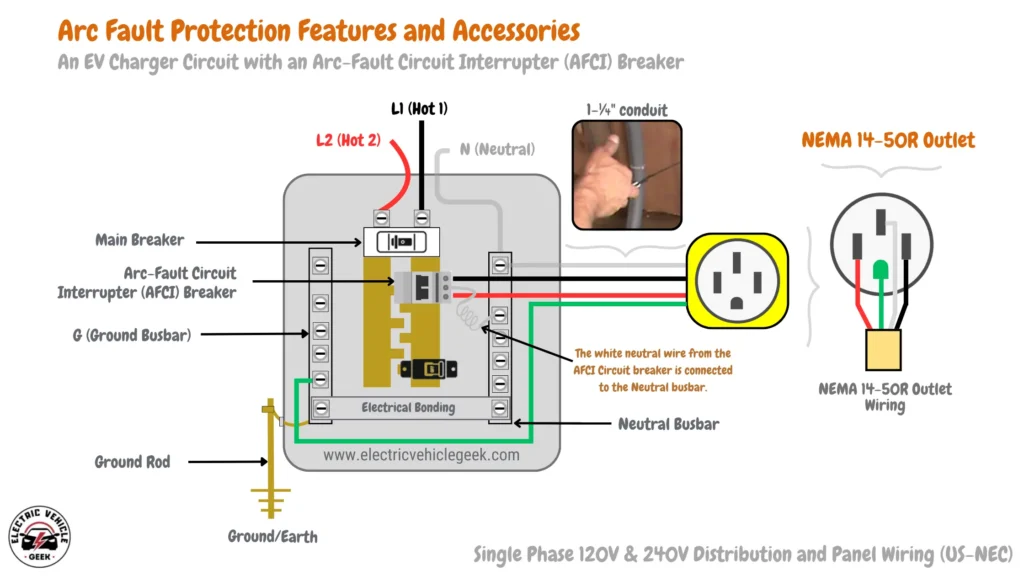
In this blog post, we will highlight the importance, functionality, and benefits of using Arc fault EV charger circuit breakers in your EV charger installations, to guide electric vehicle owners on modern electric vehicle EV charger installation safety measures.
Table of Contents
- Do EV Chargers Need AFCI Protection?
- Best Arc Fault EV Charger Circuit Breakers
- How do Arc Fault EV Charger Circuit Breakers Work?
- Benefits of Using Arc Fault EV Charger Circuit Breakers In EV Charging.
- Difference Between Arc Fault (AFCBs) and Ground Fault Circuit Interrupters (GFCI) EV Charger Circuit Breakers
- What Causes Arc Fault EV Charger Circuit Breakers to Trip?
- Conclusions.
- Related Posts:
Do EV Chargers Need AFCI Protection?
Yes, a NEMA 14-50 outlet used in the installation of Level 2 EV chargers requires an arc fault EV charger circuit breaker to enhance the EV charger installation protection against arc faults.
Arc faults in EV charging installation occur when the electrical current in an electrical vehicle branch circuit deviates from its intended path, this can cause overheating of components used in an electrical vehicle branch circuit such as wires, EV charger circuit breaker, outlets, and the EV charger itself, potentially leading to fires.
According to statistics 3-5 electric cars catch fire while charging, by using an arc fault EV charger circuit breaker in EV charger installations, we can detect arc faults, overloads, short circuits, ground faults, faulty AFCB, and electrical noises before they escalate into hazardous situations when charging an electric vehicle.
Best Arc Fault EV Charger Circuit Breakers
The following are Arc fault EV charger circuit breakers we recommend for hardwired and plug-in EV charger installations:
| Circuit Breaker (amps) | Arc Fault EV Charger Circuit Breakers | Recommended Wire Size (NEC 80/20) | Power Rating of EV Charger (kW) |
|---|---|---|---|
| 15 | SIEMENS QA115AFC 15-Amp Single Pole 120-volt Plug-On Combination AFCI Breaker | 14 AWG | 2.8 |
| 20 | Siemens QA120AFC 20-Amp Single Pole 120-volt Plug-On Combination AFCI Breaker | 12 AWG | 3.8 |
| 30 | Siemens QF230AP 30 Amp, 2 Pole, 120/240V Ground Fault Circuit Interrupter with Self Test and Lockout Feature | 10 AWG | 5.7 |
| 40 | SIEMENS QF240A Ground Fault Circuit Interrupter, 40 Amp, 2 Pole, 120/240 Volt, 10,000 AIC | 8 AWG | 7.6 |
| 50 | Eaton GFTCB250 Plug-On Mount Type GFTCB Ground Fault Circuit Breaker 2-Pole 50 Amp 120/240 Volt AC | 6 AWG | 9.6 |
| 60 | SIEMENS QF260A 60 Amp, 2 Pole, 120/240V Ground Fault Circuit Interrupter with Self-Test Feature | 4 AWG | 11.5 |
How do Arc Fault EV Charger Circuit Breakers Work?
Arc fault EV charger circuit breakers are installed in an electric vehicle branch circuit in the main electrical panel or the EV charger subpanel to differentiate between normal electrical arcs in an EV charger installation, especially in plug-in EV chargers where plugging and unplugging of the EV charger in the electric vehicle branch circuit outlet cab cause abnormal arcs, they are also installed in hardwired EV charger installations to detect abnormal arcs that can be caused by damaged and deteriorating of the electric vehicle branch circuit wiring.
In an EV charger installation, Arc fault EV charger circuit breakers monitor the electrical waveform in an electrical vehicle branch circuit and analyze it for specific characteristics associated with arc faults, when an abnormal arc is detected in an electric vehicle branch circuit, the Arc fault EV charger circuit breakers opens the circuit to isolate the fault and prevent EV charger fires.
Benefits of Using Arc Fault EV Charger Circuit Breakers In EV Charging.
There are several reasons why a licensed electrical or certified EV charger installer can recommend the installation of Arc fault EV charger circuit breakers in an EV charger installation, some of the reasons include:
Prevent EV Charging Fires.
Arc fault EV charger circuit breakers installed in an electric vehicle branch circuit minimize the risk of EV charging fires by detecting and mitigating arc faults while using an EV charger, Arc fault EV charger circuit breakers provide an added safety measure to your EV charger installation.
EV Charger Installation Code Compliance.
Arc fault EV charger circuit breakers are required by electrical codes for specific home EV charger installations and commercial EV charger installations, installing Arc fault EV charger circuit breakers in electric vehicle branch circuits ensures compliance with electric vehicle EV charger installations’ legal requirements and ensures the safety of EV charging and prevents potential legal issues in case of EV charging fire incidents which can be costly.
EV Charging Sensitivity Detections.
Although modern EV chargers have systems in place to detect arc faults, installing an Arc fault EV charger circuit breaker in an electric vehicle branch circuit can help detect low-level arc faults in EV charging that the EV charger might overlook, the heightened sensitivity of Arc fault EV charger circuit breakers allows early intervention and reduced EV charging fires.
Electric Vehicle Branch Circuit Compatibility.
Arc fault EV charger circuit breakers are compatible with most electric vehicle branch circuit electrical panels, making them easy to integrate into existing main electrical panels, or electric vehicle branch circuits.
Reduction of EV Charging Fires.
Arc fault EV charger circuit breakers reduce the risk of EV charging fires which can be due to arc faults, overloads, short circuits, ground faults, faulty AFCB, and electrical noises in electric vehicle charger installations, reducing the likelihood of electrical shocks, damage of EV charging equipment, and other electrical issues.
Difference Between Arc Fault (AFCBs) and Ground Fault Circuit Interrupters (GFCI) EV Charger Circuit Breakers
Arc fault EV charger circuit breakers (AFCBs) are used in EV charger installations to prevent fires caused by arc faults in an electric vehicle branch circuit, while Ground Fault Circuit Interrupters (GFCI) EV Charger Circuit Breakers are used to protect the electric vehicle branch circuit from electrical shocks where water and components used in the electric vehicle branch circuit may come into contact, such as outdoor EV charger installations.
What Causes Arc Fault EV Charger Circuit Breakers to Trip?
Arc fault EV charger circuit breakers installed in an electric vehicle branch circuit can lead to nuisance tripping, interrupting charging even when the EV isn’t plugged in. Here’s why:
Arc Faults
The most apparent reason for an arc fault EV charger circuit breaker trip is the detection of an arc fault in your electrical vehicle branch circuit, arc fault in an electrical vehicle branch circuit occurs when electrical current jumps from one electrical conductor to another in an EV charger installation, possible causes can be due to damaged or deteriorating wires used in an electric vehicle branch circuit, loose connections in junction boxes, or equipment used in the electric vehicle branch circuit, or faulty equipment used in an EV charger installation.
Arc fault EV charger circuit breakers arc fault detection technology can identify abnormal arc faults in an EV charger installation and respond by shutting off power to the electric vehicle branch circuit to prevent EV charging fires.
Overloads
Arc fault EV charger circuit breakers are installed to detect arc faults in an electric vehicle branch circuit, however, they are also effective in detection of overload issues in the EV charging installation. EV charging overload can occur when there is excessive current flowing through the electric vehicle branch circuit, surpassing the Arc fault EV charger circuit breaker rated capacity.
Although Arc fault EV charger circuit breakers are not as sensitive to EV charging overloads as traditional EV charger circuit breakers, they may trip in extreme cases of overcurrent when using an EV charger.
Short Circuits
Short circuits in an electric vehicle branch circuit occur when conductors come into direct contact bypassing the normal resistance of the electric vehicle branch circuit. short circuits in an EV charger installation create surges in electrical currents that can cause the Arc fault EV charger circuit breakers to trip, preventing EV charging fires and damage to EV charging equipment.
Ground Faults
Advanced Arc fault EV charger circuit breakers have built-in ground fault detection features that can detect ground faults in EV charger installations, ground faults in EV charging occur when energized EV charging wires come into contact with grounding conductors or the grounding components of an electric vehicle branch circuit, ground faults in an electric vehicle branch circuit can cause Arc fault EV charger circuit breakers to trip in response to such faults.
Faulty Arc Fault EV Charger Circuit Breakers
Arc fault EV charger circuit breakers installed in an electric vehicle branch circuit can become faulty over time due to wear and tear, especially in outdoor EV charger installations due to environmental factors, and also in indoor installations due to manufacturing defects, a defective Arc fault EV charger circuit breaker may trip repeatedly or fail to compromise the safety of your EV charger installation.
Electrical Noises
In some EV charger installations, electrical noses or interference can lead to the tripping of an Arc fault EV charger circuit breaker due to false detection triggers, although rare we have had issues where electromagnetic disturbances are close to the EV charger installation.
Conclusions.
Arc Fault EV Charger Circuit Breakers (AFCBs) are a critical safety upgrade in an EV charger installation, offering advanced protection against EV charging fires. However, for optimal performance, ensure a qualified electrician handles EV charger installation to guarantee code compliance and proper operation.
Regular visual inspections and functionality tests can help prevent nuisance tripping and identify potential issues early. By prioritizing expert assistance and maintenance, Arc Fault EV Charger Circuit Breakers deliver the superior EV charging safety and peace of mind you deserve.
Related Posts:
- Electric Vehicle Charger Circuit Breaker Selection Guide
- Molded Case Circuit Breakers in EV Charging
- EV Charger Circuit Breaker Keeps Tripping
- Can You Use Tandem Breakers for EV Charging
- Siemens EV Charger Circuit Breakers
- Shunt Trip Breakers for EV Charging Safety

James Ndungu is a certified EV charger installer with over five years of experience in EVSE selection, permitting, and installation. He holds advanced credentials, including certification from the Electric Vehicle Infrastructure Training Program (EVITP) and specialized training in EV charging equipment and installation, as well as diplomas in EV Technology and Engineering Fundamentals of EVs. Since 2021, James has tested dozens of EV chargers and accessories, sharing expert insights into the latest EV charging technologies.



